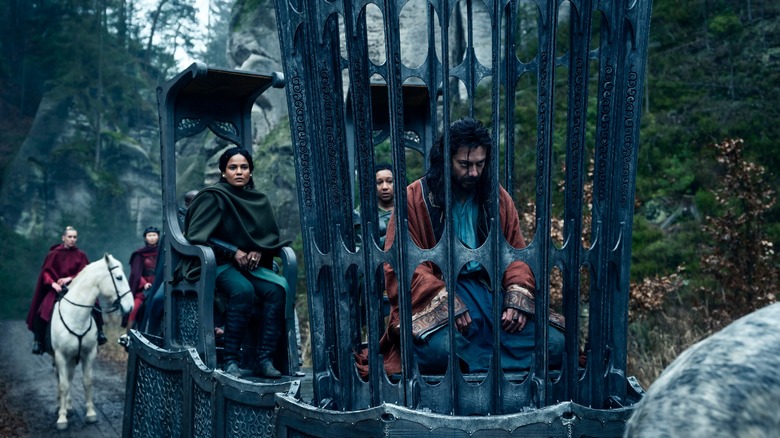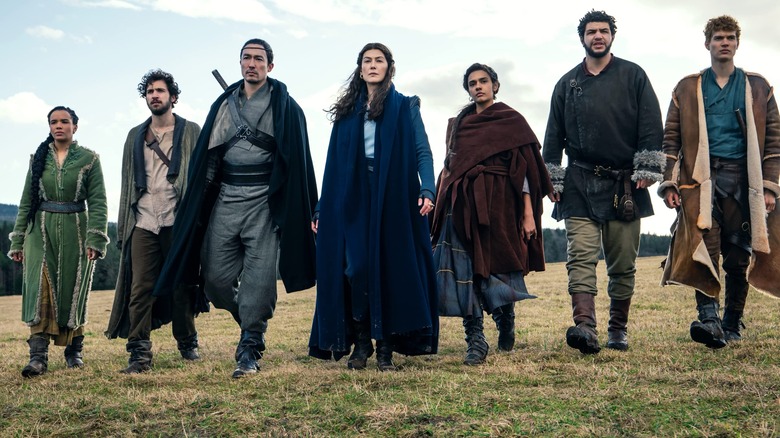Amazon Is Already Spending Game Of Thrones Money To Make The Wheel Of Time
In case you haven't heard the big news — the next "Game of Thrones" is on the way! It's called... "Westworld"? Or maybe "The Witcher"? Perhaps it's "The Expanse"? Or Amazon's "Lord of the Rings"? So many shows have had the title thrown their way, that it's getting pretty hard to keep track. But the latest addition to the club has been getting the comparison since the project was first announced.
Amazon's upcoming fantasy epic, "The Wheel of Time" shares much in common with HBO's crown jewel — both are based on best-selling series set in sprawling fantasy worlds, fit with a large cast of characters and an intricate magic system. Other than that ... they are utterly dissimilar. "The Wheel of Time" follows a member of a powerful all-female organization as she embarks on a perilous, world-spanning journey. But though the two tell completely different stories, that certainly won't be enough to save Amazon's upcoming epic from the many comparisons. Part of this is simply the lasting impact of "Game of Thrones." For years, the series held us all in a vice grip, as the show to watch. And even when it left the air, its approach to storytelling and effect on audiences remained.
The Cost of Recreating Thrones
GQ recently went inside the set of "The Wheel of Time," revealing some details behind the series production. Once scene described dozens of crew members and extras getting soaked in rain, whilst live horses wandered the set and people with smoke canisters misted the area to set the scene. Executive producer Mike Weber told GQ that this level of grand scale and realism is a norm set by "Thrones" — especially when it comes to the financials. Weber said:
"It's not like we can go say, 'Oh, you know, Game of Thrones, season one, they only spent this. The audience expectation is coming off of the last season of Game of Thrones, not the first season."
During its first season, HBO spent about $6 million an episode on "Game of Thrones," but as the scale of storytelling increased and the audience grew exponentially, that number steadily climbed. By season 6, $10 million an episode was standard, and in its final season, "Game of Thrones" required $15 million for longer, battle-focused episodes. With the goal of matching that production value, "Wheel of Time" is starting at upward of $10 million per episode. More than anything, this showcases the great lengths studios are willing to go, in the hopes of mirroring the success of "Thrones."
"The Wheel of Time" showrunner and executive producer Rafe Judkins added:
"One of the crazy things about now is just how ready and willing networks are to just look you in the eye, and you say, 'I'm going to build the Two Rivers and then we're going to burn it down at the end of episode one.' And they're like: 'Great. What's next?'"
The Next Great Fantasy Series?
As far as TV studios go, Amazon and Apple have the advantage of being two of the richest brands in the business. They have the flexibility to tackle these risks and try for their own expensive epic. Under the direction of Bezos, as reported in Brad Stone's "Amazon Unbound," the studio spent $3.2 billion in 2016 alone. By 2019, the number was nearly doubled. Stone also wrote that Bezos told the team at Amazon Studios, in no unclear terms, "I want my 'Game of Thrones.'" Naturally, his way of getting that was throwing more money at the studio. Billionaire he may be, Bezos is no TV producing expert. As the final season of "Game of Thrones" can attest, money doesn't equal great storytelling.
The complicated truth is that while "Thrones" absolutely amazed with its stunningly detailed dragons and mind-blowing war scenes, that's not where the show began. Audiences were won over by characters not spectacle. Watching an army get massacred by dragon fire was a great, bloody cherry on top, but before the epic finale, HBO was cutting battle scenes from the story because the budget simply didn't exist. In its place were brilliant performances, memorable dialogue, and characters worth obsessing over. Production value is a big appeal, but can't be confused with great TV.


